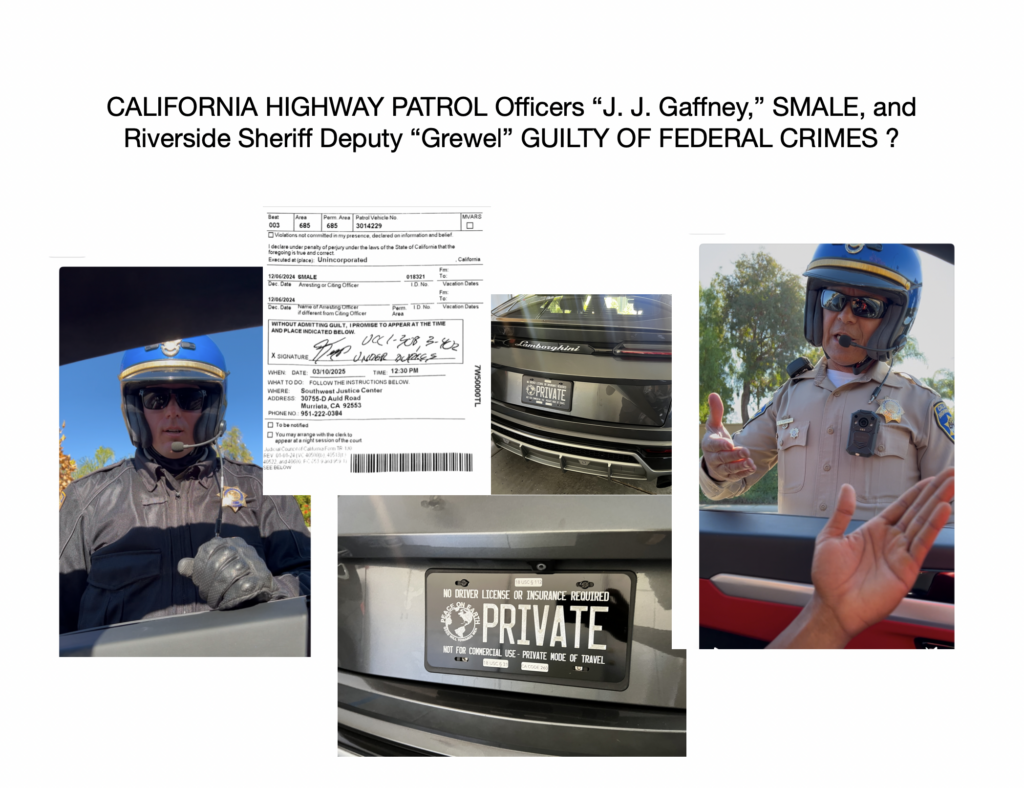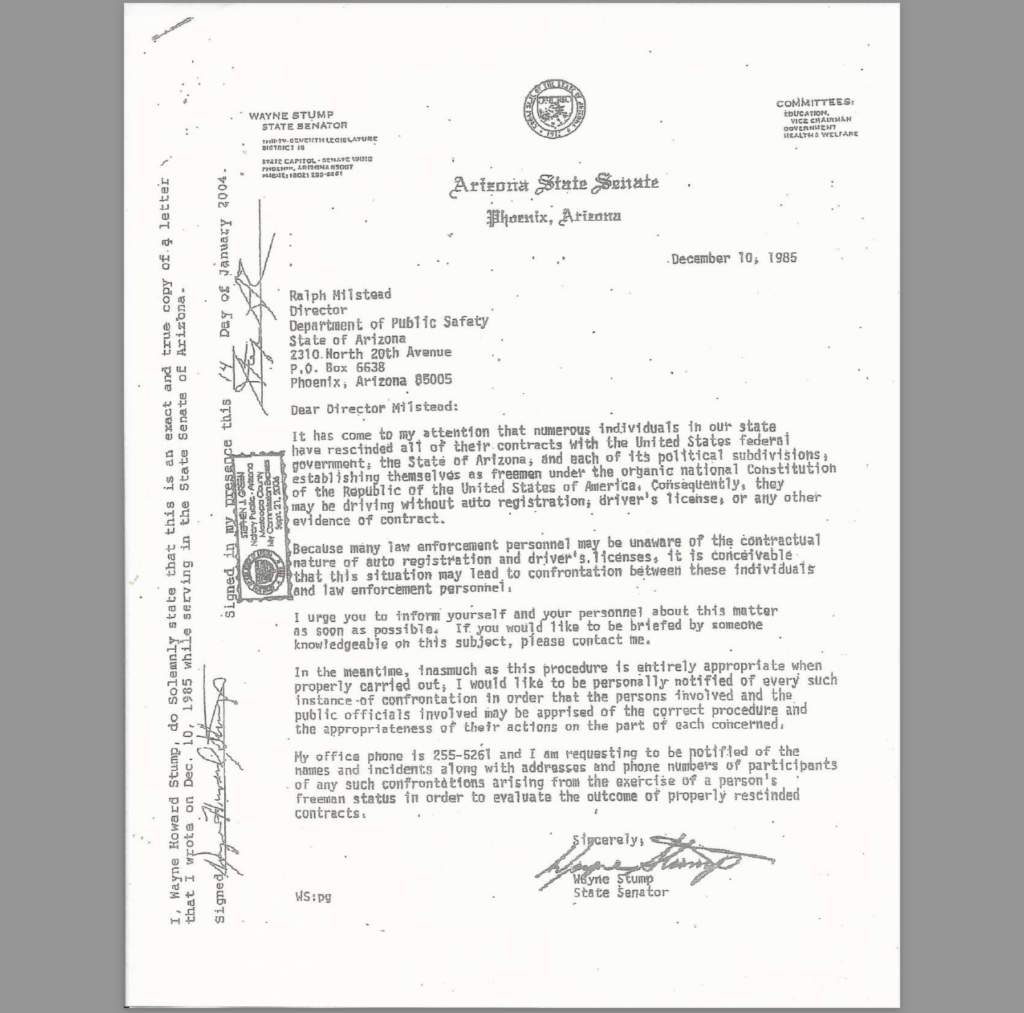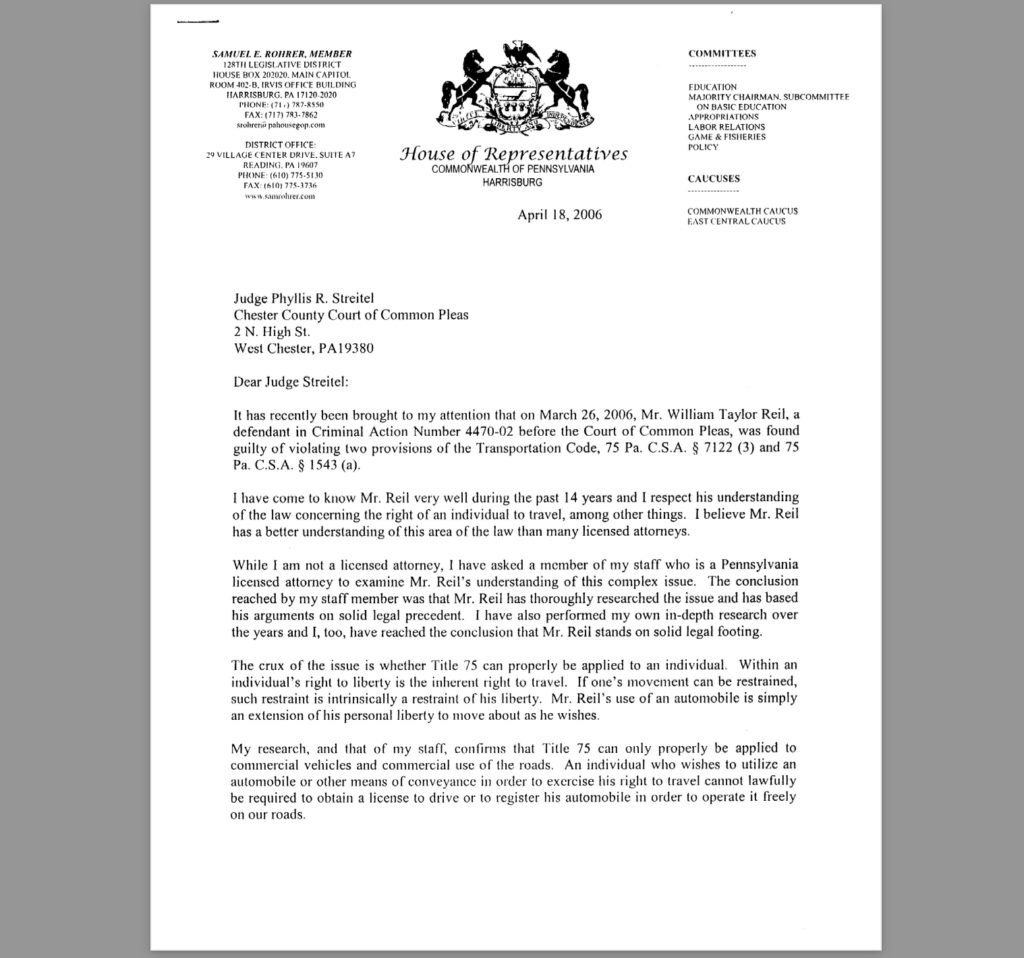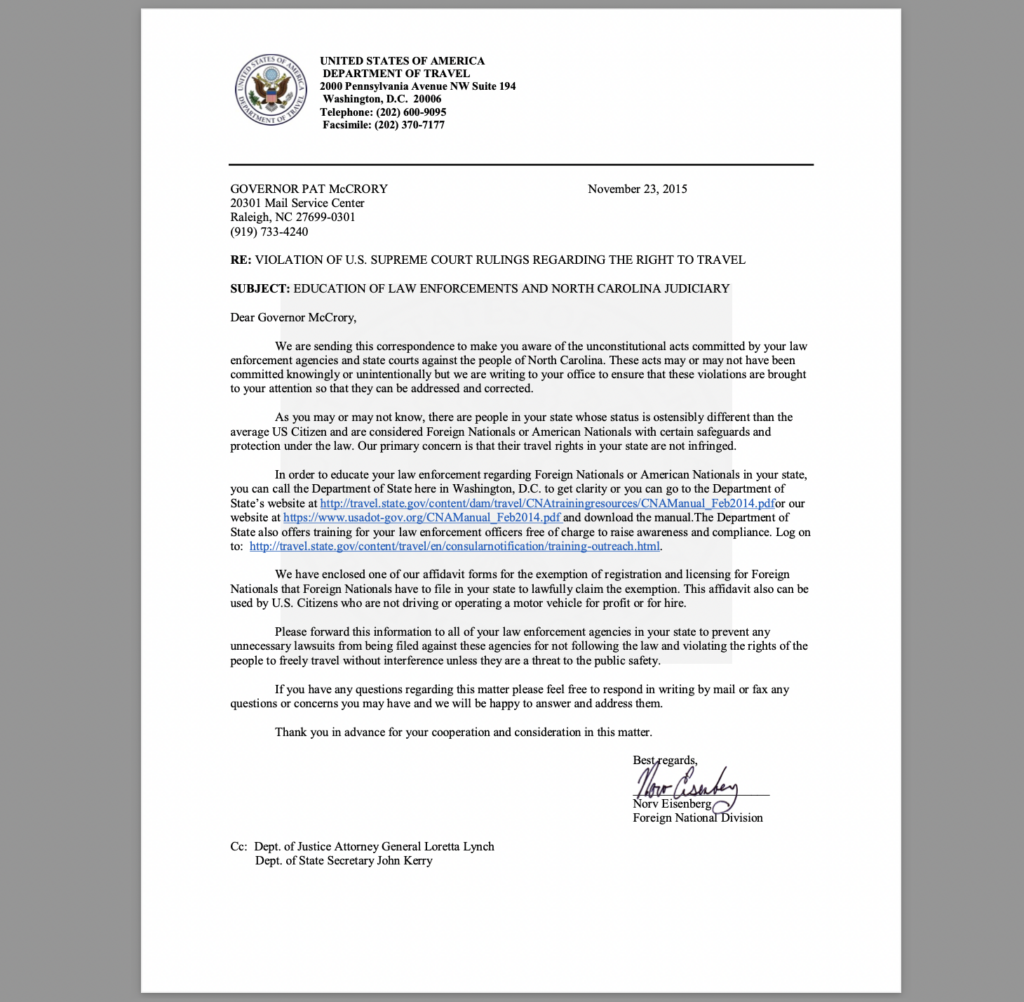
Private Traveler Rights: Is Stopping a ‘PRIVATE’ Vehicle a Federal Offense?
Pulling over a man or woman traveling privately in a non-commercial automobile marked “PRIVATE” without lawful cause can constitute a violation of constitutional rights and federal law. When law enforcement applies commercial laws intended for motor vehicles to private automobiles, such actions may cross into criminal conduct and civil liability under state and federal statutes.
Federal and Constitutional Protections
1. The Right to Travel
The right to travel is a fundamental liberty recognized under the U.S. Constitution and supported by case law:
- Kent v. Dulles (1958): The U.S. Supreme Court stated that the right to travel is a fundamental right not to be arbitrarily restricted.
- Shapiro v. Thompson (1969): The Court reaffirmed that the right to travel freely between states cannot be infringed without a compelling reason.
- Murdoch v. Pennsylvania (1943): The government may not license or regulate constitutionally protected activities.
Traveling for personal purposes in a private automobile is considered an unalienable right, distinct from the government-regulated privilege of operating a commercial motor vehicle.
2. Fourth and Fifth Amendments
- The Fourth Amendment protects against unreasonable searches and seizures. Stopping a private automobile without probable cause violates this constitutional safeguard.
- The Fifth Amendment ensures due process and prohibits individuals from being compelled to perform under contracts or statutes they did not voluntarily agree to, such as those governing commercial vehicles.
Federal Statutes
18 U.S.C. § 241 – Conspiracy Against Rights
This law criminalizes any conspiracy to oppress, threaten, or intimidate individuals in exercising their constitutional rights. Unlawfully stopping a private traveler in their automobile constitutes an act under color of law to oppress their right to travel freely.
18 U.S.C. § 242 – Deprivation of Rights Under Color of Law
This statute prohibits law enforcement from depriving any person of their rights, privileges, or immunities secured by the Constitution or federal laws while acting under color of law. Stopping a private automobile for alleged violations of commercial statutes, such as vehicle registration, when those statutes do not apply, could fall under this provision.
Statutory and Legal Definitions
18 U.S.C. § 31(6) – Federal Definition of “Motor Vehicle”
A “motor vehicle” is defined as a vehicle “used for commercial purposes,” specifically for transporting goods or passengers for hire. This definition excludes private automobiles used for personal travel.
California Vehicle Code § 260 – Definition of Commercial Vehicles
California Vehicle Code § 260 defines a “commercial vehicle” as one primarily used for transporting persons or property for compensation or profit. This definition excludes private automobiles used for personal, non-commercial purposes.
Automobile vs. Motor Vehicle
Automobile
An automobile refers to a private mode of conveyance used by individuals for personal purposes. It is not subject to licensing, registration, or insurance requirements because it is not engaged in commerce. Courts have supported this distinction:
- Hale v. Henkel (1905): The individual has the right to use their private property for lawful purposes without owing duties to the state unless trespassing upon others’ rights.
Motor Vehicle
A motor vehicle is defined as a vehicle used for commercial purposes, such as transportation for hire. These are subject to regulatory requirements, including licensing, registration, and insurance.
The distinction is critical. Statutory requirements for motor vehicles do not apply to private automobiles, and enforcing these requirements on private travelers constitutes fraud and overreach.
California Vehicle Code Violations
Stopping a private automobile marked “PRIVATE” for failure to comply with commercial regulations is unlawful because:
- No Jurisdiction: The private automobile is not a motor vehicle under California Vehicle Code § 260 or 18 U.S.C. § 31(6).
- No Probable Cause: Without evidence of a public safety violation, such stops are arbitrary and violate constitutional protections.
- Fraudulent Enforcement: Applying commercial statutes to private travel misrepresents the scope of the law and may constitute fraud under federal and state statutes.
Implications of Unlawful Stops
18 U.S.C. §§ 241 and 242
Officers who stop private travelers without probable cause risk criminal liability for violating federal rights. Such stops may involve coercion to comply with commercial statutes, which violates the Fourth Amendment, Fifth Amendment, and Fourteenth Amendment.
42 U.S.C. § 1983
Victims of such stops can pursue civil action against officers and agencies for deprivation of constitutional rights.
Case Law and Precedent Supporting the Right to Travel in a Private Automobile
- Thompson v. Smith (1930): The Supreme Court ruled that the right to travel is a common law right that cannot be regulated as a mere privilege.
- Stephenson v. Rinford (1932): Highways are public property intended primarily for private use, with commercial use being “special and extraordinary.”
- Miller v. U.S. (1956): Exercising a constitutional right, such as the right to travel, cannot be converted into a crime.
Use defines classification:
-
- It is well established law that the highways of the state are public property, and their primary and preferred use is for private purposes, and that their use for purposes of gain is special and extraordinary which, generally at least, the legislature may prohibit or condition as it sees fit.” Stephenson vs. Rinford, 287 US 251; Pachard vs Banton, 264 US 140, and cases cited; Frost and F. Trucking Co. vs. Railroad Commission, 271 US 592; Railroad commission vs. Inter-City Forwarding Co., 57 SW.2d 290; Parlett Cooperative vs. Tidewater Lines, 164 A. 313
- The California Motor Vehicle Code, section 260: Private cars/vans etc. not in commerce / for profit, are immune to registration fees:
- (a) A “commercial vehicle” is a vehicle of a type REQUIRED to be REGISTERED under this code”.
- (b) “Passenger vehicles which are not used for the transportation of persons for hire, compensation or profit, and housecars, are not commercial vehicles”.
- (c) “a vanpool vehicle is not a commercial vehicle.”
- 18 U.S. Code § 31 – Definition, expressly stipulates, ”The term “motor vehicle” means every description of carriage or other contrivance propelled or drawn by mechanical power and used for commercial purposes on the highways in the transportation of passengers, passengers and property, or property or cargo”.
- A vehicle not used for commercial activity is a “consumer goods”, …it is NOT a type of vehicle required to be registered and “use tax” paid of which the tab is evidence of receipt of the tax.” Bank of Boston vs Jones, 4 UCC Rep. Serv. 1021, 236 A2d 484, UCC PP 9-109.14.
- “ The ‘privilege’ of using the streets and highways by the operation thereon of motor carriers for hire can be acquired only by permission or license from the state or its political subdivision. “—Black’s Law Dictionary, 5th ed, page 830.
- “It is held that a tax upon common carriers by motor vehicles is based upon a reasonable classification, and does not involve any unconstitutional discrimination, although it does not apply to private vehicles, or those used by the owner in his own business, and not for hire.” Desser v. Wichita, (1915) 96 Kan. 820; Iowa Motor Vehicle Asso. v. Railroad Comrs., 75 A.L.R. 22.
- “Thus self-driven vehicles are classified according to the use to which they are put rather than according to the means by which they are propelled.” Ex Parte Hoffert, 148 NW 20.
- In view of this rule a statutory provision that the supervising officials “may” exempt such persons when the transportation is not on a commercial basis means that they “must” exempt them.” State v. Johnson, 243 P. 1073; 60 C.J.S. section 94 page 581.
- “The use to which an item is put, rather than its physical characteristics, determine whether it should be classified as “consumer goods” under UCC 9- 109(1) or “equipment” under UCC 9-109(2).” Grimes v Massey Ferguson, Inc., 23 UCC Rep Serv 655; 355 So.2d 338 (Ala., 1978).
- “Under UCC 9-109 there is a real distinction between goods purchased for personal use and those purchased for business use. The two are mutually exclusive and the principal use to which the property is put should be considered as determinative.” James Talcott, Inc. v Gee, 5 UCC Rep Serv 1028; 266 Cal.App.2d 384, 72 Cal.Rptr. 168 (1968).
- “The classification of goods in UCC 9-109 are mutually exclusive.” McFadden v Mercantile-Safe Deposit & Trust Co., 8 UCC Rep Serv 766; 260 Md 601, 273 A.2d 198 (1971).
- “The classification of “goods” under [UCC] 9-109 is a question of fact.” Morgan County Feeders, Inc. v McCormick, 18 UCC Rep Serv 2d 632; 836 P.2d 1051 (Colo. App., 1992).
- “The definition of “goods” includes an automobile.” Henson v Government Employees Finance & Industrial Loan Corp., 15 UCC Rep Serv 1137; 257 Ark 273, 516 S.W.2d 1 (1974).
The RIGHT to Travel is not a Privilege:
-
-
- “No State government entity has the power to allow or deny passage on the highways, byways, nor waterways… transporting his vehicles and personal property for either recreation or business, but by being subject only to local regulation i.e., safety, caution, traffic lights, speed limits, etc. Travel is not a privilege requiring, licensing, vehicle registration, or forced insurances.” Chicago Coach Co. v. City of Chicago, 337 Ill. 200, 169 N.E. 22.
- The fundamental Right to travel is NOT a Privilege, it’s a gift granted by your Creator and restated by our founding fathers as Unalienable and cannot be taken by any Man / Government made Law or color of law known as a private “Code” (secret) or a “Statute.”
- “Traveling is passing from place to place–act of performing journey; and traveler is person who travels.” In Re Archy (1858), 9 C. 47.
- “Right of transit through each state, with every species of property known to constitution of United States, and recognized by that paramount law, is secured by that instrument to each citizen, and does not depend upon uncertain and changeable ground of mere comity.” In Re Archy (1858), 9 C. 47.
- Freedom to travel is, indeed, an important aspect of the citizen’s “liberty”. We are first concerned with the extent, if any, to which Congress has authorized its curtailment. (Road) Kent v. Dulles, 357 U.S. 116, 127.
- The right to travel is a part of the “liberty” of which the citizen cannot be deprived without due process of law under the Fifth Amendment. So much is conceded by the solicitor general. In Anglo Saxon law that right was emerging at least as early as Magna Carta. Kent v. Dulles, 357 U.S. 116, 125.
- “Even the legislature has no power to deny to a citizen the right to travel upon the highway and transport his property in the ordinary course of his business or pleasure, though this right may be regulated in accordance with public interest and convenience. Chicago Coach Co. v. City of Chicago, 337 Ill. 200, 169 N.E. 22, 206.
- “… It is now universally recognized that the state does possess such power [to impose such burdens and limitations upon private carriers when using the public highways for the transaction of their business] with respect to common carriers using the public highways for the transaction of their business in the transportation of persons or property for hire. That rule is stated as follows by the supreme court of the United States: ‘A citizen may have, under the fourteenth amendment, the right to travel and transport his property upon them (the public highways) by auto vehicle, but he has no right to make the highways his place of business by using them as a common carrier for hire. Such use is a privilege which may be granted or withheld by the state in its discretion, without violating either the due process clause or the equal protection clause.’ (Buck v. Kuykendall, 267 U. S. 307 [38 A. L. R. 286, 69 L. Ed. 623, 45 Sup. Ct. Rep. 324].
- “The right of a citizen to travel upon the highway and transport his property thereon in the ordinary course of life and business differs radically an obviously from that of one who makes the highway his place of business and uses it for private gain, in the running of a stage coach or omnibus. The former is the usual and ordinary right of a citizen, a right common to all; while the latter is special, unusual and extraordinary. As to the former, the extent of legislative power is that of regulation; but as to the latter its power is broader; the right may be wholly denied, or it may be permitted to some and denied to others, because of its extraordinary nature. This distinction, elementary and fundamental in character, is recognized by all the authorities.”
- “ Even the legislature has no power to deny to a citizen the right to travel upon the highway and transport his/her property in the ordinary course of his business or pleasure, though this right may be regulated in accordance with the public interest and convenience.” [“regulated” means traffic safety enforcement, stop lights, signs etc.]—Chicago Motor Coach v. Chicago, 169 NE 22.
- ”The claim and exercise of a constitutional right cannot be converted into a crime.”—Miller v. U.S., 230 F 2d 486, 489.
- ”There can be no sanction or penalty imposed upon one because of this exercise of constitutional rights.” —Sherar v. Cullen, 481 F. 945
- The right of the citizen to travel upon the highway and to transport his property thereon, in the ordinary course of life and business, differs radically and obviously from that of one who makes the highway his place of business for private gain in the running of a stagecoach or omnibus.”— State vs. City of Spokane, 186 P. 864.
- ”The right of the citizen to travel upon the public highways and to transport his/her property thereon either by carriage or automobile, is not a mere privilege which a city [or State] may prohibit or permit at will, but a common right which he/she has under the right to life, liberty, and the pursuit of happiness.” —Thompson v. Smith, 154 SE 579.
- “The right of the Citizen to travel upon the public highways and to transport his property thereon, in the ordinary course of life and business, is a common right which he has under the right to enjoy life and liberty, to acquire and possess property, and to pursue happiness and safety. It includes the right, in so doing, to use the ordinary and usual conveyances of the day, and under the existing modes of travel, includes the right to drive a horse drawn carriage or wagon thereon or to operate an automobile thereon, for the usual and ordinary purpose of life and business.”— Thompson vs. Smith, supra.; Teche Lines vs. Danforth, Miss., 12 S.2d 784
- “The use of the highways for the purpose of travel and transportation is not a mere privilege, but a common and fundamental Right of which the public and the individual cannot be rightfully deprived.”—Chicago Motor Coach vs. Chicago, 169 NE 22;Ligare vs. Chicago, 28 NE 934;Boon vs. Clark, 214 SSW 607;25 Am.Jur. (1st) Highways Sect.163.
- “The right to b is part of the Liberty of which a citizen cannot deprived without due process of law under the Fifth Amendment. This Right was emerging as early as the Magna Carta.” — Kent vs. Dulles, 357 US 116 (1958).
- ”The state cannot diminish Rights of the people.” —Hurtado vs. California, 110 US 516.
- “Personal liberty largely consists of the Right of locomotion — to go where and when one pleases — only so far restrained as the Rights of others may make it necessary for the welfare of all other citizens. The Right of the Citizen to travel upon the public highways and to transport his property thereon, by horse drawn carriage, wagon, or automobile, is not a mere privilege which may be permitted or prohibited at will, but the common Right which he has under his Right to life, liberty, and the pursuit of happiness. Under this Constitutional guarantee one may, therefore, under normal conditions, travel at his inclination along the public highways or in public places, and while conducting himself in an orderly and decent manner, neither interfering with nor disturbing another’s Rights, he will be protected, not only in his person, but in his safe conduct.” —II Am.Jur. (1st) Constitutional Law, Sect.329, p.1135.
- Where rights secured by the Constitution are involved, there can be no rule making or legislation which would abrogate them.” —Miranda v. Arizona, 384 U.S.
- ”The state cannot diminish Rights of the people.” —Hurtado vs. California, 110 US 516.
-
Conclusion
Stopping a private traveler in an automobile marked “PRIVATE” without probable cause or jurisdiction violates federal and state laws, including 18 U.S.C. §§ 241 and 242 and California Vehicle Code § 260. Such actions infringe upon the constitutional right to travel, apply statutes unlawfully, and expose law enforcement to criminal and civil liability.
Law enforcement must distinguish between private automobiles and motor vehicles used for commercial purposes to avoid infringing upon the unalienable rights of private travelers.
See: Pending $900 Billion Lawsuit Against California Highway Patrol and Riverside Sheriff Chad Bianco: Protecting the Right to Travel














